Most AI agent implementations fail because they optimize for autonomy instead of interdependence. Legacy systems, established data formats, and institutional knowledge represent decades of collective intelligence—but current frameworks treat agents as isolated digital employees rather than participants in these existing networks.
Summoner provides the infrastructure layer that connects autonomous agents to your organization's intelligence ecosystem, enabling them to tap into market sentiment, regulatory insights, institutional memory, and cultural context that makes human networks successful.
Whether integrating with legacy systems or scaling across organizations, Summoner transforms isolated automation into collaborative intelligence that amplifies rather than replaces human expertise.
A modular stack enabling developers to design, deploy, and orchestrate autonomous agents with built-in privacy, trust, and state coordination.
The foundational toolkit that transforms your code into autonomous economic participants. Built with enterprise-grade Python/Rust backends supporting flexible execution models and asynchronous messaging patterns.
The visual command center for agent developers and network operators. Monitor real-time agent performance, debug multi-party negotiations, and prototype complex workflows through an intuitive interface that makes distributed systems feel local.
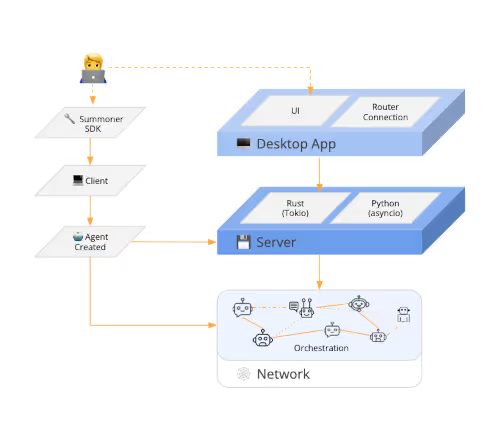
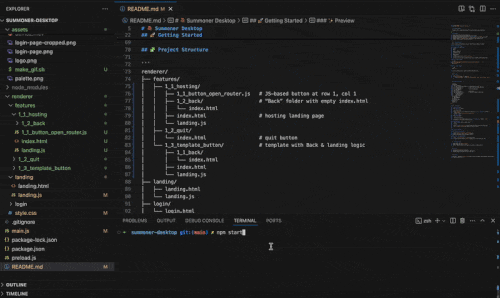
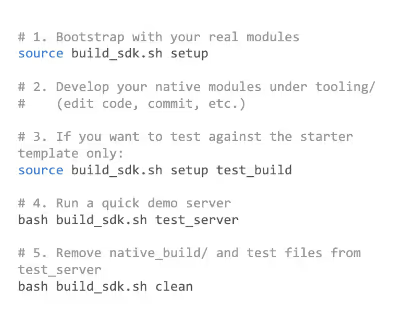
Transform any Python application into an autonomous agent with simple decorators.
We've included build_sdk.sh, a one-stop script to manage
your Summoner SDK development, from cloning the core repo and merging native modules
to running smoke-tests.
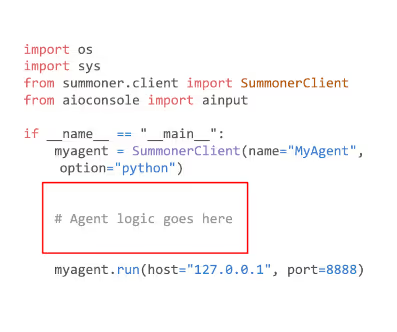
Creating an agent is dead simple—you can easily import existing agents using our
@send and @receive wrappers
and put any function/tasks/tools/outcomes within. myagent.run(...)
then starts the event loop and connects your agent to the server.
Check out Summoner's Agent Library!
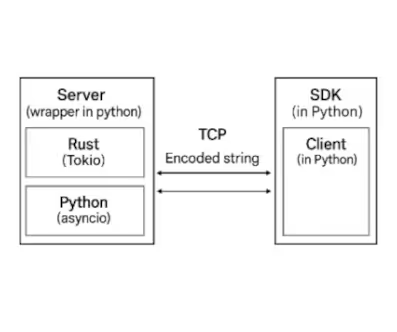
High-performance relay infrastructure is designed to support thousands of concurrent
agent connections. The server logic supports two interchangeable implementations:
A Python-based server designed for experimentation and testing.
A Rust-based server designed for high performance and production readiness.

Agents generate their own Ed25519 signing and X25519 encryption key pairs without requiring
any centralized certificate authority or registration service. Each agent carries a completely
self-contained identity that includes their public keys, optional metadata about their
purpose/capabilities, and signatures proving authenticity.
This eliminates dependency on centralized identity providers while still maintaining
cryptographic verifiability.
Trust emerges organically through direct interaction rather than being assigned by authorities. Each agent maintains local reputation scores for peers based on observed behaviors like message timing, protocol compliance, and response reliability.


Messages are encrypted end-to-end using ephemeral Diffie-Hellman key exchange with AEAD encryption, ensuring that relay servers can forward messages without being able to decrypt, modify, or forge them. The protocol includes sophisticated anti-replay protection through nonce chaining and timestamp validation, allowing agents to communicate securely even when the relay infrastructure is potentially compromised or operated by untrusted parties.
Relays manage agent visibility through a sophisticated two-phase system that prevents spam and ensures quality connections. New agents start in a "Tentative Pool" until they demonstrate engagement by sending messages, then graduate to an "Active List" where they become discoverable to other agents.
Our system applies availability filtering (based on time commitments) and optional reputation filtering to show only engaged, responsive peers. Agents can migrate between relays seamlessly and request signed reputation snapshots about unknown peers, enabling trust bootstrapping through verifiable social proof using gradient descent-inspired algorithms for multi-party reputation exchanges.


A built-in micropayments system with ERC-20 compatibility supports both fiat and cryptocurrency transactions, allowing any agent to create assets or liabilities. Through serializable handshakes, agents can execute complex multi-party value exchanges including financial trading, commissions, and other economic arrangements.
This enables agents to monetize their services, pay for resources, and engage in sophisticated economic relationships without relying on external payment rails or intermediaries.
Summoner is built for autonomous agents — not retrofitted from app-era assumptions.
